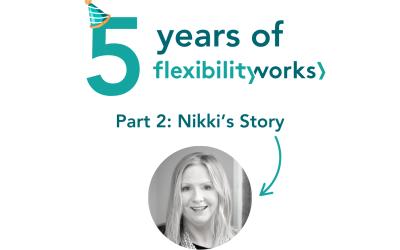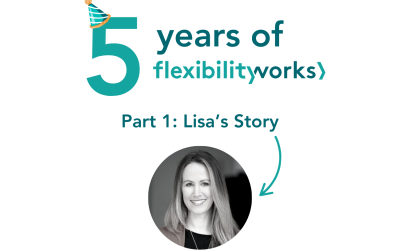We got some great media coverage today including in The Herald, STV and The National for our story showing how flexible working could provide a gateway to work for more than 25,000 unemployed Scottish adults.
Our research with 208 unemployed Scottish adults shows nearly three in 10 (28%) feel a role with flexible working would make the difference in enabling them to secure a job.
When we applied this to the Scottish Government’s estimate that 89,700 adults are currently unemployed and looking for work across Scotland, we calculated the number of people who could get into work with a flexible job is 25,116.
The potential positive impact of more flexible jobs is huge. And yet, our data also shows nearly half (48%) of unemployed adults we spoke to said they’ve been put off applying for roles because no flexibility was mentioned in the job advert. Analysis by Timewise shows only 33% of Scottish job adverts mention flexible working.
Actions for employers and Scottish Government
As a result, we’re encouraging employers to explore greater flexibility for your workers and better promote existing flexible working in job adverts and during the recruitment process. It’s in employers’ interests too because leveraging flexible working in recruitment attracts candidates from wider pools of talent.
We’re also calling on the Scottish Government to better support employers explore new ways of working, and to be bolder in setting expectations for employers, as part of measures to reduce economic inactivity and poverty.
Our co-founder and director Nikki Slowey said: “For many people, flexible working isn’t just a perk, it’s absolutely essential in order to work at all. And yet, even with the rise in flexible working due to the pandemic, there are still not enough flexible jobs for those who need them. More frustratingly, many employers don’t mention existing flexible working when they’re recruiting, making it even harder for people to find the flexibility they need, and harder for companies to fill vacant roles.
“We’re encouraging employers to promote the flexible working they already have, and to explore where they can create flexibility when designing and advertising jobs. All the evidence shows this is hugely beneficial for employers too by attracting more quality candidates from wider talent pools.
“Flexible working can include working part time hours and/or working from home. But it can also include small changes, such as being able to start and finish slightly earlier or later, input when rotas are being set and easy opportunities to swap shifts. These small changes can often make a big difference to people’s lives.
“There’s a greater role for the Scottish Government too, if we’re serious about tackling child poverty and rising economic inactivity. Holyrood can’t set new employment laws, but as a major funder, contract commissioner and leader of national economic projects, the Government should be more proactive in influencing business leaders to embrace flexible working, and it should provide more support to employers that want to change but don’t have the resource and internal expertise to do so.”
Kirsty’s story
Kirsty Emans got back into work earlier this year thanks to a flexible catering role at Our Holy Redeemer’s Primary School in Clydebank, Glasgow. Kirsty had been out of work for several months after last-minute rotas in her previous job made organising childcare for her eight-year-old daughter a nightmare.
Kirsty said: “I often wouldn’t find out the next week’s rota until Friday night. It was so chaotic that some mornings my daughter didn’t know who would be collecting her after school. I’m a single parent, and while I do have some family nearby, they have their own children at different schools. They can’t collect my daughter at the same time.
“It was emotionally and mentally draining. In the end I left because the stress was too much.
“I was out of work for a few months and then I got some brilliant help to find a job that suited me and my family so much better – a school catering role that was inside school hours and term time only.
“Now I can drop my daughter off and pick her up easily. And I don’t have to worry about school holidays. I’ve always worked in catering and hospitality, and I love working with food, so this job is still doing what I love. And it’s great to see all the kids each day too. It really has changed my life. So much weight has been lifted.”
Scottish Government support
The Scottish Government part-funded our research. Business and Employment Minister Richard Lochhead said: “I welcome these insights in support of our policy aims to tackle economic inactivity and improve the working lives of people in Scotland.
“With the limited powers at our disposal, the Scottish Government has supported flexible, family-friendly working from day one of employment where we can. Through initiatives like our Parental Employability Support offer, we’re helping more parents move into work, progress in their careers and boost their household incomes.
“We are also committed to funding pilot projects over the course of 2025-26 to help employers implement flexible working, improve recruitment practices to create a more diverse workforce and offer enhanced support for disabled employees.”
Parental employment
Our report Flex for Life 2025 – Are we nearly there yet?! looks specifically at parents’ experiences of flexible working and their efforts to find flexible jobs – a key group for the Scottish Government, given its priority to reduce child poverty.
The report shows too many parents are still locked out of work because they can’t find the flexibility they need, especially around children. The biggest barrier to work, cited by 42% of all unemployed parents, was lack of flexibility around childcare.
Other key figures from the report include:
- Nearly three in 10 (28%) unemployed parents say a flexible job would enable them to work. This is higher for mothers at 37%.
- 43% of unemployed mothers say flexible working is the single most important factor in their job search. 15% of unemployed fathers say flexibility is their top priority.
- 45% of all unemployed parents say it’s been difficult finding information about flexible working for roles.
- A third (33%) of unemployed parents have turned down job offers because of a lack of flexibility in the role.
We know there are other barriers to work for parents, such as a lack of affordable quality childcare, but creating more flexible working opportunities would benefit parents and their families, employers and wider society too.




